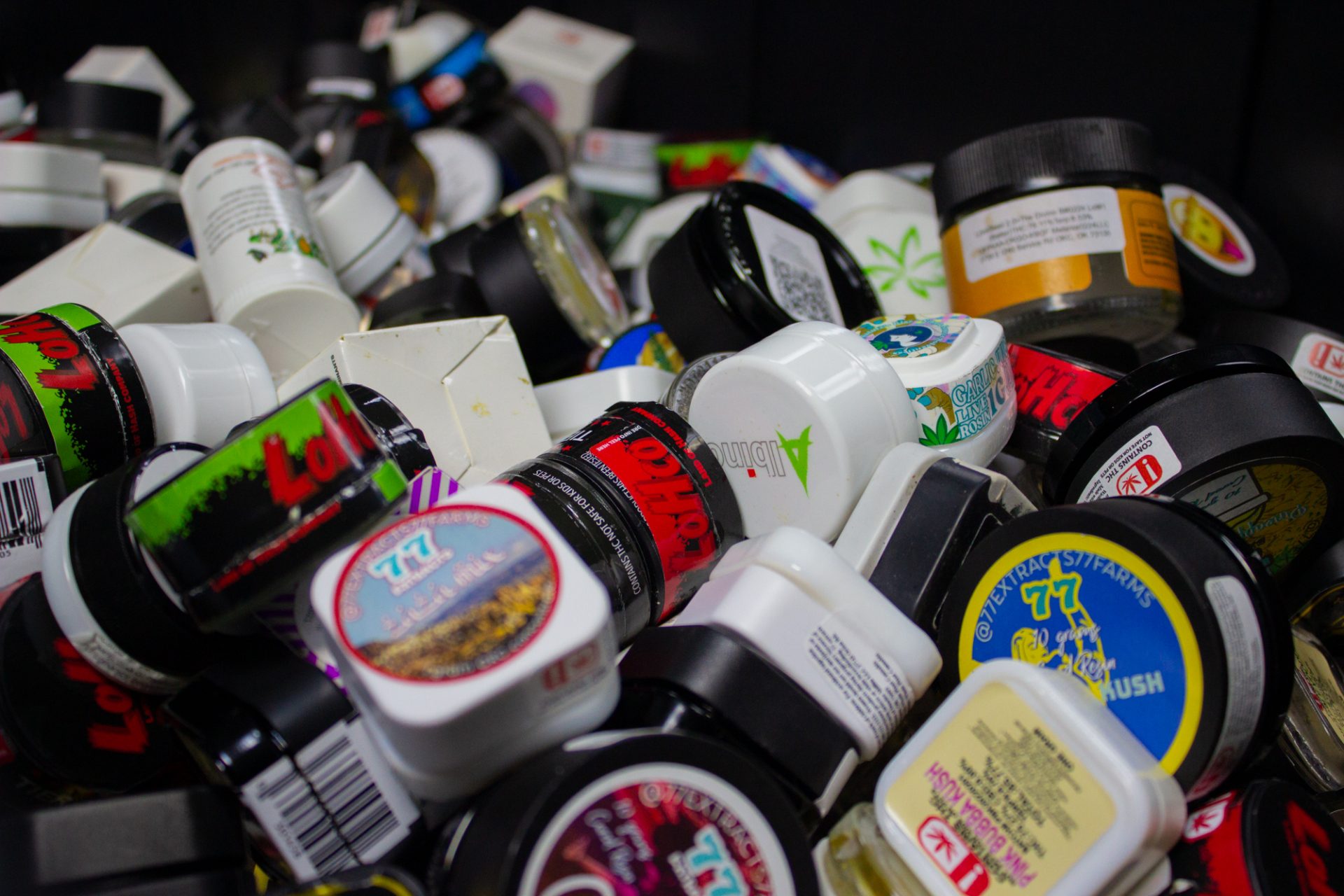
Plastic and glass containers fill a tub at a recycling drive at the Great Barrier Reefer Dispensary in Bethany, Oklahoma.


Plastic and glass containers fill a tub at a recycling drive at the Great Barrier Reefer Dispensary in Bethany, Oklahoma.
At Primetime Buds dispensary in Tahlequah, medical cannabis patients used to turn in their spent, empty containers for a discount on their next purchase. A company would periodically pick up the boxes of used plastic pop-tops and haul them off to be recycled.
But when the pickup company shut down, those boxes began to stack up.
Blaine Mooney manages the dispensary, and he said the limited storage space was overrun with boxes upon boxes of used containers. Mooney said they sold about a thousand new pop-tops every week, and much of that would return to the store.
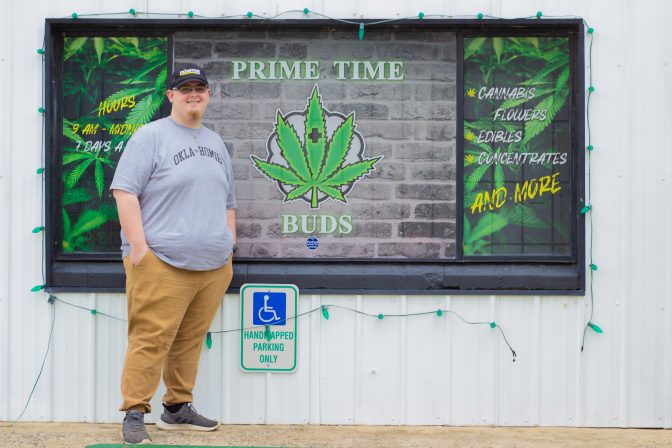
Beth Wallis / StateImpact Oklahoma
Blaine Mooney stands outside of Primetime Buds in Tahlequah. Mooney says even though it’s stopped recycling containers, the dispensary still participates in community events like clothing drives.
But eventually, he said they had to stop taking them back. The used containers were occupying so much space, they didn’t have room to stock new ones.
“We couldn’t even buy enough [new containers] because of the storage,” Mooney said. “It was just a big old circle.”
With Oklahoma’s medical marijuana scene growing rapidly, industry professionals and cannabis patients are feeling the weight of packaging waste. But a lack of recycling infrastructure and an unwillingness to raise prices for sustainable packaging have left Oklahoma unprepared to handle the growing mountains of plastic packing the state’s landfills.
The plastic container output at Primetime Buds alone was around 4,000-5,000 pop-tops every month. Oklahoma has more than 2,300 dispensaries, and nearly 10% of the state’s population carries a medical marijuana card. It’s a lot of waste, and recycling it can get complicated.
For instance, there are seven common types of plastic. Plastic pop-tops — also called drams — are usually made from No. 5 plastic, but can also be made from other plastics.
But not all recycling centers take every kind of plastic. For example, the Metropolitan Environmental Trust (the MET) is a nonprofit that oversees 11 Tulsa-area recycling centers, and none of them take No. 5 plastics. In Recycle This Tulsa’s full list of area recycling centers, only one takes No. 5.
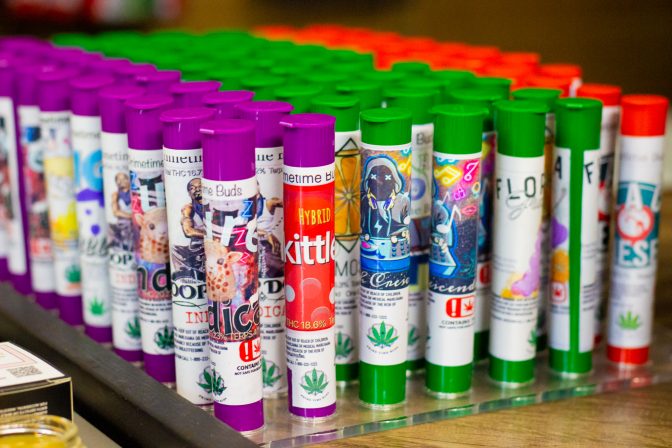
Beth Wallis / StateImpact Oklahoma
Pre-roll pop-top tubes are on display at Primetime Buds in Tahlequah. Pre-roll tubes are the only kinds of pop-tops the dispensary still sells.
But pop-tops aren’t the only waste coming out of the burgeoning industry. Cannabis is also packaged in glass jars and flexible packaging bags. These bags — the most well known being Mylar bags made by DuPont — are made by combining No. 1 plastic with aluminum foil. While both of these materials can be recycled on their own, few centers have the capability to separate them.
But the waste isn’t just coming from the consumer side of the industry — it’s also in manufacturing.
Gerald Whalen is the CEO of 7DayWeek.com and Whalen Industries. He specializes in packaging and frequently works with the cannabis industry. For one, most Mylar brand bags are made outside of the U.S., which means they have to be shipped from overseas. 2-3% of the world’s carbon emissions come from overseas shipping.
Another issue with Mylar is printing. Instead of water-based eco solvent ink, Mylar bags are printed with oil-based solvent ink. Whalen said printing with this ink is hazardous — so much so that fumes have to be piped out of the printing building.
Once in 2005, he was working with solvent ink without realizing a vent had been closed. Soon, his corneas were burned from the fumes. Another time, printing fumes were being piped out of a window, directly in front of a bush. He said within 24 hours, the bush was dead.
“That is how dangerous that is,” Whalen said. “It has to slightly burn into the material so that it stays on.”
The constant flurry of legislative attempts to change packaging regulations also contributes to the industry’s waste. Whalen said he’s had clients print $15,000 worth of labels only to be confronted with a statutory packaging change that renders the new labels useless.
“A lot of people don’t realize that you have to take into consideration the ink that was used, the material that was used, and then the laminate that goes on top of it that was used. There is just a lot more that goes into this than people know,” Whalen said. “And this stuff has a direct impact on our environment, especially when you’re just having 15,000, 10,000, 20,000 printed, and then they just go right in the trash.”
Whalen said it’s not shocking anymore to see $2000-5000 worth of labels thrown in the trash after being made unusable by new laws. The trickle of new packaging and labeling regulations has also spooked clients into buying smaller quantities, afraid they’ll waste money on bulk purchases. This, Whalen said, is also a big problem.
For instance, each printing session yields excess material because of how much it takes to initially load into a printer. Whalen said if it takes three feet of material to load the printer and leaves about two feet at the end where it cuts off, there’s about five feet of leftover material.
But that same amount of excess happens regardless of the number of labels printed, whether it’s 10,000 or 250. Clients concerned about future regulatory changes will often make several orders of fewer labels at a time, leading to more excess material than if a client bought a bulk order at once.
“We could do this [print in large quantities] if we knew that this [set of regulations] would be the case for five years or ten years,” Whalen said. “But we can’t do it right now because we’re worried.”
But traditional plastics and flexible packaging, while cheaper, aren’t the only ways to contain cannabis. Industry innovators are taking steps to rewrite the future of cannabis waste.
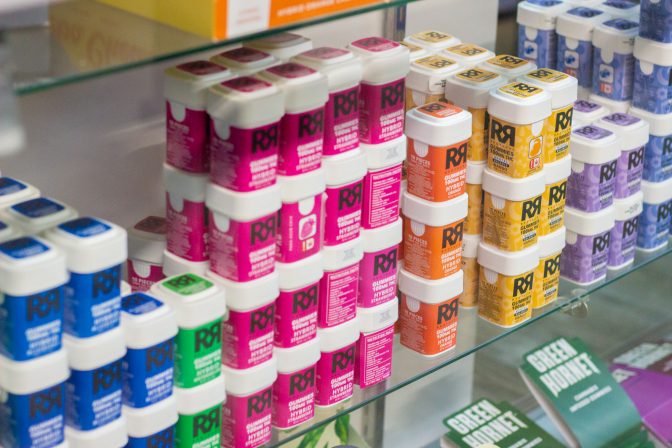
Beth Wallis / StateImpact Oklahoma
Plastic containers of THC gummies line display cases at Primetime Buds in Tahlequah.
Sharina Perry is the founder and inventor of Utopia Plastix, a company that specializes in a plant-based alternative to traditional petroleum-based plastics. Utopia Plastix makes the plant resin, and manufacturers can use it in their existing petroleum applications without modifying their equipment. The material is recyclable, degradable and compostable.
Utopia Plastix works with farmers who grow USDA-approved, low maintenance crops that absorb carbon at four to five times the rate of trees. Perry said Utopia Plastix doesn’t exist to “beat up on plastics,” but rather to offer an alternative to products with high environmental impacts.
“How can we create a product that when it’s recycled, yes, it can be made into something else? But if it does end up in our landfill, that [it] is adding a benefit to the environment rather than actually just extracting [from] it?” Perry said. “And so that’s really the intentionality of what we’re doing with Utopia, is to look at how we use and consume our natural resources, that we are focused on truly, truly doing it in a holistic way to address the issue.”
But dispensaries like Primetime Buds have been hesitant to adopt sustainable packaging, mainly due to the price. Dispensaries are in a race to the bottom with prices, created by a highly competitive market averse to increasing prices on consumers.
To put into perspective, California has 10 times the population of Oklahoma and has had medical marijuana available since 1996 — and yet, California has around 900 dispensaries to Oklahoma’s 2,300. With such a saturated market, dispensaries around the state are constantly knocking down prices just to compete.
“I get asked maybe three or four times a day, like how bad is the market?” Blaine said. “And I think it’s horrible, I won’t even lie. I mean, sometimes it’s nice because you get good prices on good stuff. But then again, I mean, right down the road, they’re probably selling it a little bit cheaper. So they just lower it, and the market’s gotten so destroyed.”
Mooney said he’d like to switch to alternative, eco-friendly packaging, but as of right now, the market is just too tight.
Perry acknowledged the squeeze on Oklahoma businesses, but also pointed to a changing global market that’s opening itself up to more sustainable initiatives. She said her company didn’t create the demand — the demand for eco-friendly alternatives was already here.
“There has to be some shift in that mindset. I think because Oklahoma has so many players in the cannabis space, that competition exists, and so they are having to drive down their pricing to stay afloat,” Perry said. “So honestly, if you’re driven strictly by cost, that’s where we’re probably not an ideal fit for it. Because our motto is centrally focused around sustainability.”
She said her product is two to three times more expensive than traditional petroleum-based resins. She gave the example of paper straws — plastic straws cost about half of a cent, and paper straws cost five to six times that. And even though “people don’t care so much for paper straws,” she said companies have recognized the importance of investing in sustainability and consumers have bought in.
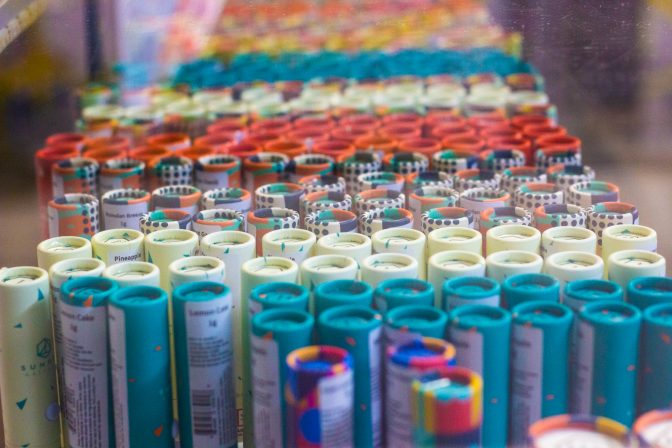
Beth Wallis / StateImpact Oklahoma
Cardboard pre-roll tubes sit in a case at Primetime Buds.
Ron Basak-Smith, the co-founder and CEO of Sana Packaging, agrees. Sana is a Colorado-based company that works with manufacturers using materials like plant-based hemp plastic and reclaimed ocean plastic to create recyclable, reusable or compostable cannabis packaging. Even with Oklahoma’s competitive market, he said he still has clients in Oklahoma.
“I’m seeing probably well over $100,000 in packaging purchased that’s gone to the state of Oklahoma,” Basak-Smith said.
Basak-Smith recognized the stresses of a demanding market, especially in less affluent areas around the state. He said it points to a larger corporate system of shirking environmental responsibilities in favor of low prices and high profits.
“In price sensitive rural areas, sustainability isn’t the concern,” Basak-Smith said. “I think it’s always been an elitist conversation sometimes to demand that everyone’s going to be able to afford these things until those who are profiting the most off of it make it a priority.”
If consumers care, he thinks businesses will be rewarded for going sustainable. But ultimately, he said it comes down to a moral question:
“Should business owners be responsible for the waste that they’re putting into the world? And should they do whatever they can to reduce it?”
One Oklahoman is taking it on herself to chip away at the mountains of packaging waste left by the booming industry.
Taylor Davis, a 28-year-old Edmond resident, drives hundreds of miles every week to pick up tubs full of pop-top drams, glass jars, tiny cardboard boxes and Mylar bags from dispensaries around the state. Since February, she’s held these recycling drives at dispensaries all over Oklahoma, which she advertises on her Instagram, @RecycleYourEmpties. She said everywhere she goes, she meets people who just can’t bring themselves to toss piles of packaging into a landfill.
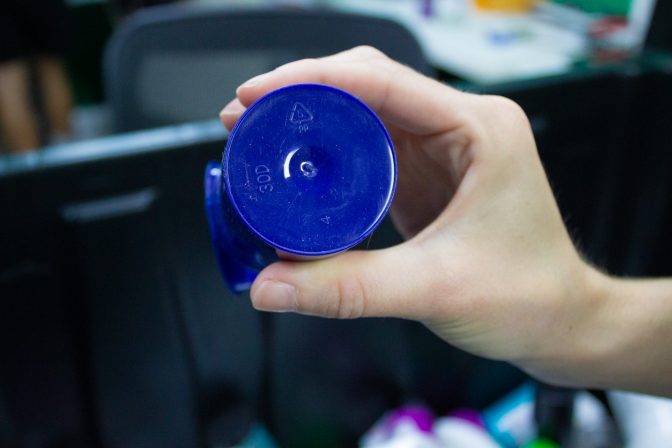
Beth Wallis / StateImpact Oklahoma
Taylor Davis holds up a pop-top dram, showing its plastic number. Most drams are made from No. 5 plastic.
“Everyone in the state has been saving them under their bed, you know, just wondering what to do with them. I’ve had people bring me duffle bags, backpacks, big, like treasure chest buckets,” Davis said. “All the time, people are like, ‘What can I do with my empty containers? Like, I just have this massive amount in my office at my house, what can I do with them?’”
That’s where Davis steps in. She takes the tubs home to her garage, sits down in front of an episode of Real Housewives, pulls on some gloves and gets to work scrubbing the containers with isopropyl alcohol and peeling off stickers. From there, she drives the cleaned containers to a recycling center.
But starting a cannabis-specific recycling network without any existing infrastructure has its issues: for one, some packaging doesn’t have a straightforward recycling solution, such as Mylar bags or vape cartridges. Davis has a tub full of problematic packaging that she doesn’t know what to do with.
The laws around what Davis is doing are murky too — she said she’s tried to get a definitive answer from authorities that what she’s doing is in fact legal, but they haven’t responded.
Authorities do seem to be aware of her program. When researching for this story, it was an Oklahoma Medical Marijuana Authority official who referred StateImpact to Davis’ Instagram.
But the work can be draining. Davis — who works full time for a cannabis processor and teaches yoga classes on the side — took on the recycling network by herself, with occasional help from friends. She spends hundreds of dollars on gas every week. She said she may need to monetize it someday to keep it financially sustainable.
One company out of Colorado did just that.
Green for Green is a company that provides receptacles to about 150 subscribing dispensaries, which Green for Green periodically picks up. It cleans the containers and either sells them back to the network for reuse or takes them to processors to turn into something new. The subscription starts at about $40 a month.
Shawn Naughton, an account manager at Green for Green, said his company has been able to divert close to 25 tons of cannabis packaging waste from Colorado landfills so far.
“We kind of just saw that there was a specific need, and there was a lot of waste occurring, and a lot of this plastic or metal or glass was just ending up inevitably in Colorado landfills,” Naughton said. “Which is really the last place that anyone who’s consuming cannabis really wanted their packaging [to go], to have a negative environmental impact.”
Like Davis, Green for Green also ran into uncharted regulatory territory. Naughton said the company had to pioneer a new statutory landscape.
“We had to… kind of push the envelope to make [authorities] make laws regarding this. And now they absolutely have,” Naughton said. “But it was kind of like there was absolutely no avenue or pathway or any guidance from [Colorado’s Marijuana Enforcement Division] on how to do this or what it looks like. So we really had to create it from the ground up completely.”
Davis hasn’t hit 25 tons yet, but she’s closing in on a half-ton of diverted packaging waste since she started five months ago. She said she’s going to take a break for a couple of months to regroup and figure out the best way to run her recycling network.
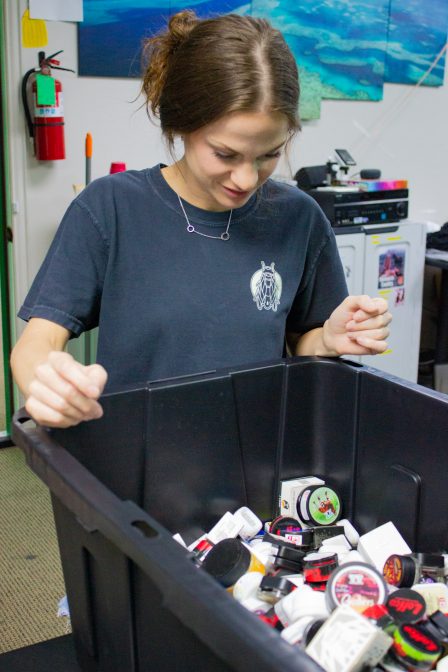
Beth Wallis / StateImpact Oklahoma
Taylor Davis looks at two hours’ worth of container collecting. Davis left the tubs at the Great Barrier Reefer Dispensary in Bethany for more people to leave their empty containers throughout the week.
And there are more changes on the horizon for Oklahoma’s weed industry that beg more questions: If a state question makes its way to November’s ballot, how will Oklahoma be able to handle the packaging waste that would arise if recreational cannabis use was legalized? Would out-of-state cannabis tourists know how or where to recycle? With the implementation of the new Metrc system, can those RFID tags be recycled at all?
Oklahoma’s cannabis industry — occasionally called a “Wild West of Weed” — is still wrought with growing pains, and that extends to the state’s management of its packaging waste. But as long as Oklahoma lacks accessible infrastructure to divert used containers, landfills will remain the most likely destination for them.
Davis and other eco-minded cannabis innovators want to ensure the plant they love doesn’t destroy the planet they live on.
“I would like to live on this Earth as long as I can,” Davis said. “And I would like it to be clean, you know?”